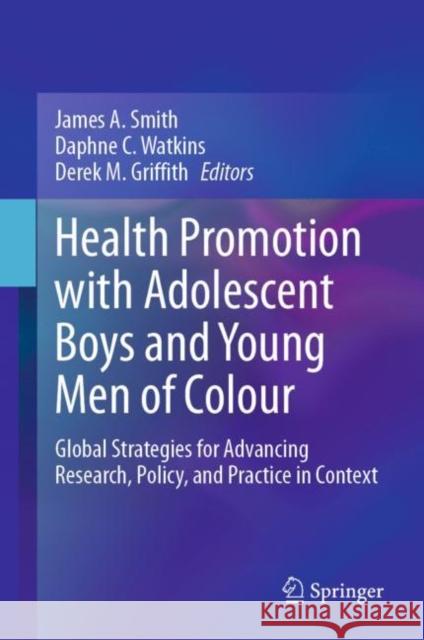Health Promotion with Adolescent Boys and Young Men of Colour: Global Strategies for Advancing Research, Policy, and Practice in Context » książka
Health Promotion with Adolescent Boys and Young Men of Colour: Global Strategies for Advancing Research, Policy, and Practice in Context
ISBN-13: 9783031221736 / Angielski / Twarda / 2023 / 383 str.
Health Promotion with Adolescent Boys and Young Men of Colour: Global Strategies for Advancing Research, Policy, and Practice in Context
ISBN-13: 9783031221736 / Angielski / Twarda / 2023 / 383 str.
(netto: 375,69 VAT: 5%)
Najniższa cena z 30 dni: 377,81
ok. 22 dni roboczych.
Darmowa dostawa!
This book highlights novel and pragmatic health promotion efforts being adopted with boys and young men of colour (BYMOC) globally that apply a strengths-based approach.Men's adoption of risky health practices and reluctance to seek help and engage in preventive health behaviours have frequently been used to explain their poorer health outcomes, particularly among adolescent boys and young men, and disproportionately affecting BYMOC. Emerging literature on equity and men's health has conveyed that intersections among age, race, sexuality, socioeconomic status and geography contribute to a complex array of health and social inequities. There is growing evidence to suggest these inequities shape the health practices of BYMOC. Unfortunately, these health and social inequities can have negative lifelong consequences. An increased focus on reducing health inequities has led to a greater focus on health promotion actions that address social and cultural determinants of health.The vulnerabilities that BYMOC face are diverse and are reflected in a range of tailored health promotion interventions. Health promotion approaches that influence structural and systemic inequities experienced by BYMOC have been a prominent feature. In this volume, the editors and contributors purposefully bring together international research and promising practice examples from Australia, the United States, New Zealand, and Canada to celebrate health promotion strategies that help to improve the health and social trajectories of BYMOC. In doing so, the book moves beyond discussing the health inequities faced by this population, to talk about the practical actions to address them in context.Health Promotion with Adolescent Boys and Young Men of Colourbrings together diffuse strands of scholarship relating to male health promotion, gender/masculinities and health, equity and men's health, and gender and youth development. The book is a unique and useful resource for practitioners, policy-makers, researchers and students with an interest in health promotion/public health, social work/social policy, education, men's health, youth development, Indigenous studies, and health and social equity.
This book highlights novel and pragmatic health promotion efforts being adopted with boys and young men of colour (BYMOC) globally that apply a strengths-based approach. Men's adoption of risky health practices and reluctance to seek help and engage in preventive health behaviours have frequently been used to explain their poorer health outcomes, particularly among adolescent boys and young men, and disproportionately affecting BYMOC. Emerging literature on equity and men's health has conveyed that intersections among age, race, sexuality, socioeconomic status and geography contribute to a complex array of health and social inequities. There is growing evidence to suggest these inequities shape the health practices of BYMOC. Unfortunately, these health and social inequities can have negative lifelong consequences. An increased focus on reducing health inequities has led to a greater focus on health promotion actions that address social and cultural determinants of health.The vulnerabilities that BYMOC face are diverse and are reflected in a range of tailored health promotion interventions. Health promotion approaches that influence structural and systemic inequities experienced by BYMOC have been a prominent feature. In this volume, the editors and contributors purposefully bring together international research and promising practice examples from Australia, the United States, New Zealand, and Canada to celebrate health promotion strategies that help to improve the health and social trajectories of BYMOC. In doing so, the book moves beyond discussing the health inequities faced by this population, to talk about the practical actions to address them in context. Health Promotion with Adolescent Boys and Young Men of Colour brings together diffuse strands of scholarship relating to male health promotion, gender/masculinities and health, equity and men's health, and gender and youth development. The book is a unique and useful resource for practitioners, policy-makers, researchers and students with an interest in health promotion/public health, social work/social policy, education, men's health, youth development, Indigenous studies, and health and social equity.











